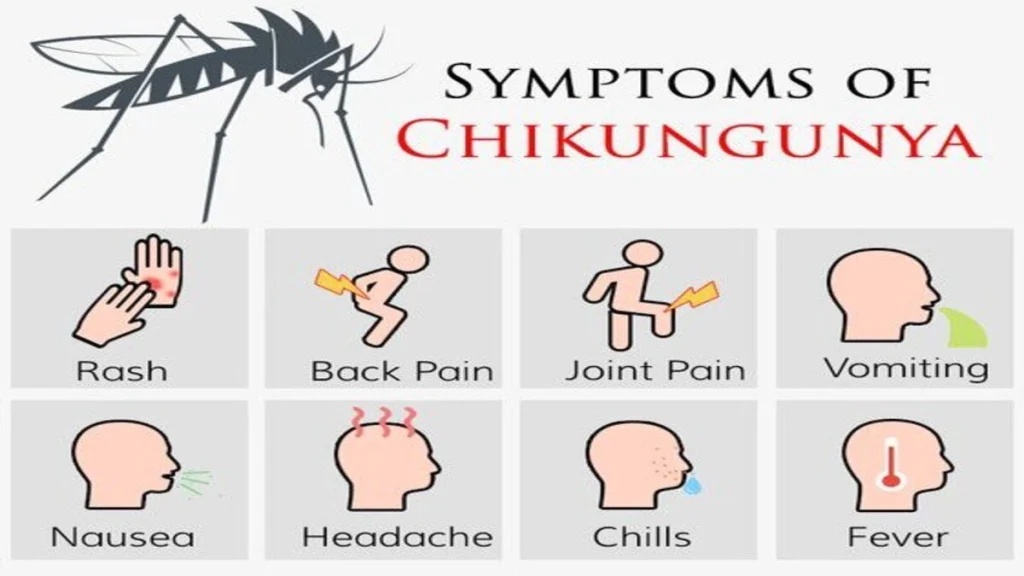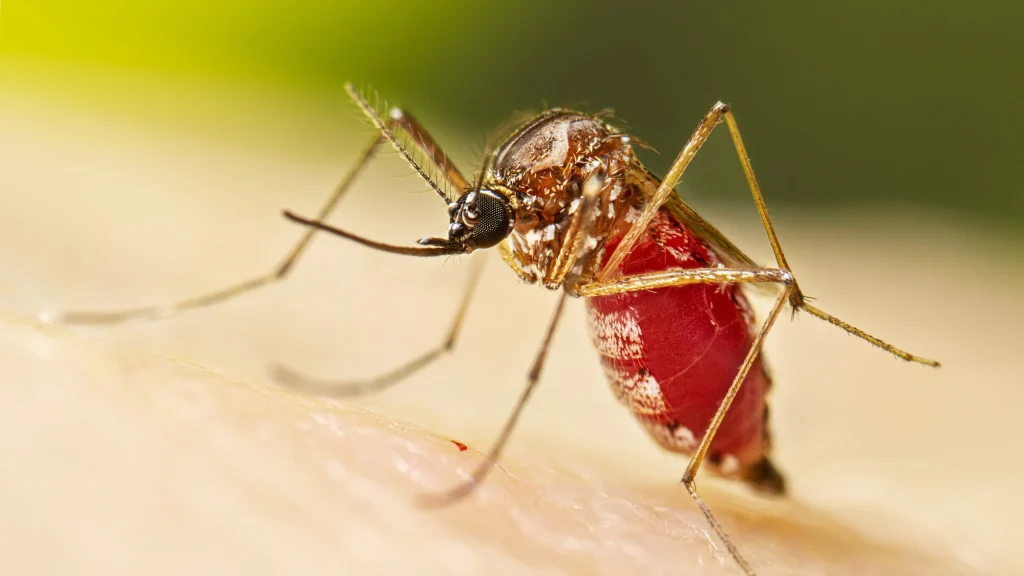Chikungunya (CHIKV) is a virus that spreads to people through mosquito bites — specifically, through the Aedes aegypti mosquito and Aedes albopictus mosquito. Chikungunya infection happens when a mosquito with the virus bites a person. The virus doesn’t spread from person to person through bodily contact or saliva, although blood transmission may be possible.
The virus causes symptoms like fever and joint pain, which can become severe. The name chikungunya means “bent over” due to the joint pain the illness is known to cause. There’s no medication to treat chikungunya. Treatment focuses on managing your symptoms. Most people recover from the illness in about one week, but some have lasting joint pain.
People traveling to areas with active chikungunya transmission should be overly cautious about avoiding mosquito bites. It’s especially important to avoid getting more mosquito bites for about one week once you have the virus. This is because an uninfected mosquito could bite you and become infected, further spreading the virus.
How common is chikungunya?
Experts believe the number of cases is underreported because its symptoms are similar to other diseases. Once only in Africa and Asia, the virus is now global, affecting more than 110 countries worldwide.
Are chikungunya and dengue the same thing?
No, they aren’t the same virus. But the same species of mosquitos spread both diseases. Dengue also has similar symptoms to chikungunya. Zika is another virus that has similar symptoms and transmission. For this reason, healthcare providers may suspect all three viruses if a person has certain symptoms and has recently traveled outside their home country.
Symptoms and Causes
What are the symptoms of chikungunya?
Symptoms of chikungunya usually develop between three and seven days after an infected mosquito bites you, although some people have symptoms as early as two days or as long as 12 days after a mosquito bite.
Fever and joint pain are the most common symptoms of chikungunya virus. The intensity of symptoms can vary depending on the person. Many people feeling crippling joint pain. The fever usually begins suddenly. Some people can have such mild symptoms that they mistake the virus for another illness or don’t visit a healthcare provider.
Other symptoms could include:
- Headache.
- Muscle pain.
- Swelling in your joints.
- Rash.
- Fatigue.
- Nausea.
Most people experience symptoms for about one week and go on to make a full recovery. Although some people have chronic joint pain after recovery.

What causes chikungunya?
Getting bitten by a mosquito that’s infected with the virus causes a person to get the virus. The virus spreads through mosquito bites, not from person to person through bodily fluids or contact. This means if you’re sick with chikungunya, you won’t pass it on to a caregiver or family member.
There have been reports of healthcare providers getting the virus after handling the blood of an infected person. This means transmission through blood is possible, but rare.
Is it contagious?
Chikungunya spreads to people through a mosquito bite. A person with the virus can’t pass it to another person through bodily fluids like saliva or by sneezing or coughing. The virus spreads only through an infected mosquito.
The risk of a person transmitting chikungunya to an uninfected mosquito is highest in the first week of the illness.
Who is most likely to get chikungunya?
You’re most likely to get the virus if you travel to a country that has a current outbreak or known transmissions. Before traveling, check with your healthcare provider or with health organizations like the World Health Organization (WHO) to see if you’re at risk of getting chikungunya on your travels.
Pregnant people with the virus don’t transmit the virus to the fetus. There’s also no evidence that shows the virus spreads to an infant through breast milk. But, people who are pregnant and near their due date should avoid traveling to countries with known cases because it may pass to their baby at delivery.
Is there chikungunya in the United States?
Yes, there have been cases of chikungunya in the U.S. But it’s rare. Only 36 cases were reported in the U.S. in 2021, according to the Centers for Disease Control and Prevention. Almost all cases occur in people who’ve returned to the U.S. from countries with active outbreaks. Some of the places that have had outbreaks reported include countries in:
- Africa.
- Asia.
- Europe.
- India.
- Islands in the Caribbean, Pacific and Indian oceans.
- Central and South America.
What are the complications of chikungunya?
The most common complication of the virus is chronic joint pain. Some people report pain for months or years after chikungunya infection.
Newborns, older adults (65 and older) and people with certain health conditions are at risk for more severe complications from the virus. These health conditions include:
Death from the virus is rare. There have been several cases where a person reports ongoing heart, eye or neurological symptoms after recovering from the virus.
Diagnosis and Tests
How is chikungunya diagnosed?
Let your healthcare provider know if you have symptoms of chikungunya and recently traveled to an area of the world with known chikungunya transmission. They can also order a blood test to diagnose chikungunya.
Management and Treatment
How is chikungunya treated?
There are medications that treat chikungunya. Treatment focuses on managing a person’s symptoms. This includes:
- Drinking plenty of fluids.
- Getting lots of rest.
- Taking acetaminophen for pain. Don’t take nonsteroidal anti-inflammatory drugs (NSAIDS) or aspirin until your healthcare provider makes a diagnosis.
Most people feel better within one week of their first symptoms. But some people report ongoing joint pain for several months or years. Most evidence suggests that once you’ve had chikungunya, you’re unlikely to get it again because you develop immunity to the virus.
Is there a cure for chikungunya?
No there isn’t a cure for chikungunya, but the illness is temporary. But you can prevent it by getting the vaccine, avoiding mosquitos and being especially cautious when traveling to areas where chikungunya outbreaks are more common.
Prevention
Can chikungunya be prevented?
How can I prevent the infection?
Adults who are at risk for getting chikungunya may choose to get a vaccine. One vaccine is approved by the U.S. Food and Drug Administration. It is an injection of a weakened chikungunya virus and the vaccine is given in one dose.
If you’re traveling to an area with known outbreaks of chikungunya, take care to prevent getting the infection. Because chikungunya isn’t spread from human to human but by mosquitoes, preventing bites is your best protection. Follow these tips to prevent mosquito bites:
- Use an insect repellent that has DEET or picaridin. Check that it’s registered by the Environmental Protection Agency.
- Wear long sleeves and pants.
- Remove standing water when possible.
- Protect yourself indoors with screens, air conditioning and mosquito netting.
If you’re pregnant, especially late in your pregnancy, don’t travel anywhere with a chikungunya outbreak. The virus can be passed on to your baby and cause serious complications.
If you’re an older adult or have a condition such as diabetes or heart disease, you have an increased risk of severe disease. If possible, don’t travel to areas with ongoing chikungunya outbreaks.
Vaccination and treatment
Since there are no specific antiviral drugs for chikungunya, the treatment focuses on managing the symptoms. This includes using pain relievers and anti-inflammatory medicines.
After recovering from chikungunya, a person is likely to have lifelong immunity against future chikungunya virus infections and is less likely to get it again in the future.
Vaccines against chikungunya virus disease are under development.
Outlook / Prognosis
What can I expect if I have chikungunya?
Severe complications from the virus are rare. The intensity of your symptoms may vary, but most people don’t experience any long-term symptoms from the virus. Current data also states that you may be immune to the virus after your first exposure, meaning you shouldn’t get it again.
How long does it last?
Most people recover from chikungunya within seven to 10 days of noticing symptoms.
Living With
How do I take care of myself?
Since there’s no medication to treat chikungunya, getting lots of rest and drinking plenty of water is the best thing you can do to care for yourself. Taking over-the-counter (OTC) pain relievers containing acetaminophen can help manage your pain and fever.
When should I see my healthcare provider?
Contact a healthcare provider if you have symptoms of chikungunya, especially if you’ve recently traveled outside the country. They can run tests to see if you have chikungunya or if it’s something else.
A note from Reprospot
Chikungunya is a virus that you get from a mosquito bite. While most people recover within a week, it can cause complications in people with certain health conditions. The best way to avoid chikungunya is to prevent mosquito bites. Wearing insect repellent, staying inside if you notice lots of mosquitos and removing standing water around your home is a great way to do this. Contact a healthcare provider if you develop a sudden fever and joint pain, especially if you’ve recently traveled to places with known chikungunya outbreaks.

